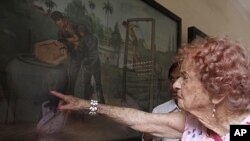A Cambodian research institute is offering free history classes on the Khmer Rouge to educate the public about the extremists who killed more than one million people. The classes are attended mainly by foreign tourists and held in the group’s former torture center.
Teacher Ser Sayana stands before a classroom of foreigners and tries to cover in 15 minutes the violent history of Cambodia’s Khmer Rouge.
She says the course, sponsored by the Documentation Center of Cambodia, has added weight because it is held in a historic site.
“They can see the building," she said. "They might have some background about the atrocity of this prison. But, they might not have the more in-depth, insightful into the whole history of the Khmer Rouge. So, this place is kind of the collection of memory of the history.”
The Khmer Rouge locked up as many as 20,000 Cambodians here, deemed enemies of the revolution. Only seven survived. The rest were tortured and executed.
Organizers hope the twice-a-week classes can help redefine Tuol Sleng as a place of education.
“Yeah, it’s really really good. I enjoyed it to get this way information about what was really going on here,” said German tourist Sebastian Poschlu.
Norwegian tourist Ingunn Jaabok says she has goose bumps after taking the class and touring the torture rooms.
“I can’t explain the feeling I have," she said. "It’s not a good feeling after the entire day. But, still it’s a good feeling cause I’m glad I’m here. I’m glad I know this. I’m glad I know this happened.”
Chum Mey, one of only two living survivors of Tuol Sleng, now works at his former prison selling books about the Khmer Rouge. He welcomes the classes but says more education is needed.
“This is not enough," he said. There must be many more [classes] so young people will understand. Once they understand they will not follow [in the footsteps] of the [Khmer Rouge].”
While the courses are now mainly aimed at tourists visiting Tuol Sleng, instructors also teach Cambodian student groups in the Khmer language. Organizers say public interest is growing and they plan to add more classes to the schedule.




